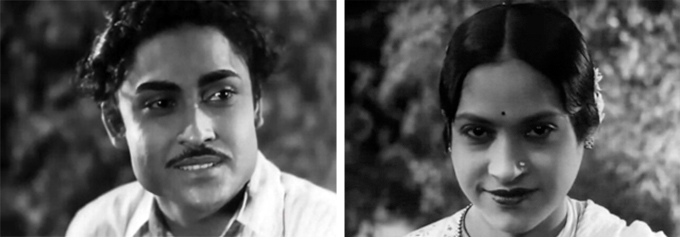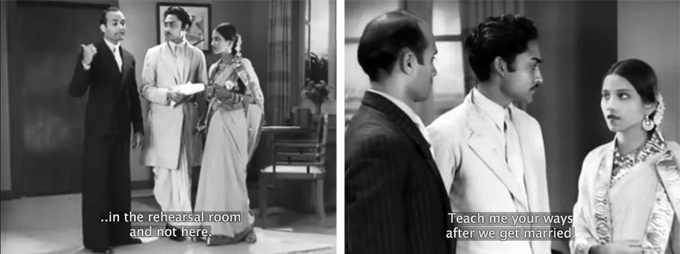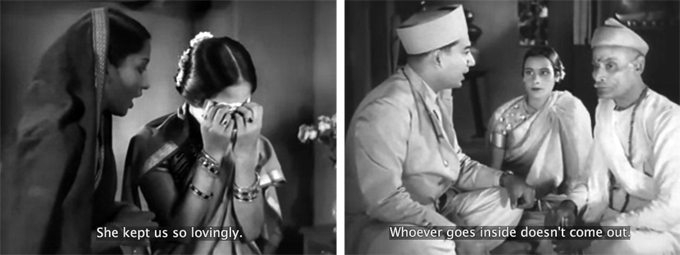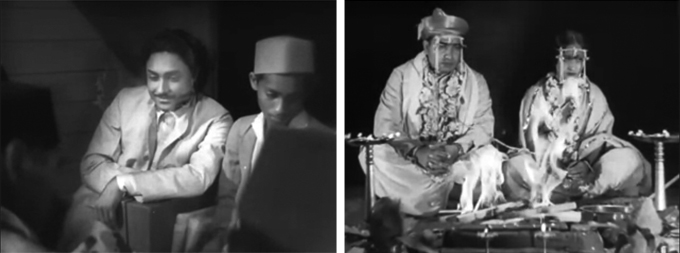
I love the elegance of the Art Deco era of the Twenties and Thirties. Of course my mother points out that I would have probably been at the back of a bread line dressed in rags, but I prefer to picture myself draped in chiffon and pearls, languidly smoking from a long cigarette holder and lounging in a posh Park Avenue mansion. Thanks to Prem Kahani, that vision has been altered slightly to one of gold-edged sarees and cocktail shakers; a quartet of musicians playing in my Marine Drive home as friends and I rehearse for a benefit we’re holding for the poor and needy (the people actually standing in that bread line of Mom’s).
But I am getting ahead of myself.
This is a lovely little film from Bombay Talkies, directed by Franz Osten with the usual assembly of BT personnel: Josef Wirsching behind the camera (oh, the photography is wonderful); Saraswati Devi and JS Casshyap providing the music and lyrics; and dashing young Ashok Kumar as our hero. He is ADORABLE. He has not one but three ladies to act opposite, in particular Maya Devi as the childhood companion he truly loves. She is absolutely gorgeous.

Also typical of BT is the progressive social theme, this one about arranged marriages and thwarted love (no, parents, you shouldn’t try to control your adult children’s lives).
The story is framed within another story (given only cursory attention at the beginning and end of the film). It opens with an angry father (NM Joshi) and beseeching mother (Bilqis) trying to convince their tearful young daughter (Aloka) that they know what’s best for her: a wealthy match instead of her poor but clever true love from her college.

The priest (M Nazir) who has come to fix the wedding overhears all this, and when he is invited by the parents to help them convince their stubborn daughter, he is surprisingly reluctant. He has a story to tell them, one from his life before becoming a priest which is also the reason behind his renunciation of worldly things.
He was a wealthy man named Chandrakant who lived with his only sister Usha (Madhurika Devi?) in a small rural town. Two widowed sisters, Heera (Tarabai Solanki) and Shanti (Saroj Borkar), also lived there with Heera’s son Jagat (Ashok Kumar) and Shanti’s daughter Maya (Maya Devi). Jagat is clever and ambitious, hoping to continue his education in Bombay. Heera and Shanti plan to marry him off to Usha, and would like Maya to marry Chandrakant, so that they have the money for his education. The priest (Kamta Prasad) who is facilitating the weddings asks to see Maya, and she not surprisingly misunderstands the situation as explained by Heera (who I guess means to say that he is fixing Maya’s marriage ALONG with Jagat’s). In Hindi it may be a more subtle distinction than the English subtitle allows.

Jagat himself when presented with his mother and aunt’s plan is not that keen on it, especially since they won’t tell him who his intended bride is. He would prefer to go to Bombay and register at the college as he’s been planning.

Maya, listening in as people do when their fates are being decided, thinks that the women are teasing Jagat. She meets him in the garden and they exchange their very gender-specific dreams—his of career success and hers of happy family life (plus, you know, the glory of dying before your husband does).

Jagat has a mentor and old family friend in Bombay named Bhagwandas (PF Pithawala), who has offered him his home and any other help he might need. Heera and Shanti want him to get married before he goes until they overhear Maya and Jagat in the garden, and realize that they love each other—especially after Maya tells Jagat that she is his bride to be.

Who could not predict that this strategy will end in tears or worse? They send Jagat off to Bombay and Bhagwandas to register for college and put their machinations for Maya’s marriage to Chandrakant into high gear.
In Bombay, Jagat is welcomed by Bhagwandas and we are treated to a drive through the streets of 1937 Bombay, complete with double-decker trolleys, taxis, horse-drawn carriages, pedestrians, and buildings which still look exactly the same today.

At home, Bhagwandas’ daughter Ramla (Vimala Devi), whom Jagat remembers from their childhood days, is planning a musical program with her friends to raise money for charity. She is all grown up and quite beautiful herself, and engaged to a man named Motilal (Manohar Ghatwai?) who is not very nice. This mystifies me, as both Bhagwandas and Ramla seem like fairly sophisticated and modern people, and I don’t understand why either of them would choose a man they clearly both fear and dislike as a husband for Ramla, but never mind. Our story might not exist without him.

Ramla’s friends are played by dancer Sunita Devi; Mumtaz Ali (actor/comedian Mehmood’s father and the “Dance Master” at Bombay Talkies); and Chandraprabha. It is great fun to watch Sunita Devi and Mumtaz Ali dance (they have two numbers, one in rehearsal and one at the show itself—which is spectacularly costumed in Arabian Nights style).

During rehearsals though, Ramla is drawn to Jagat and Motilal becomes very jealous. Seeing this—and missing his beloved Maya—Jagat decides to cut his visit short and return home. BUT (and with Bhagwandas’ approbation), he doesn’t just talk to Ramla about leaving; he stages a drunken scene at the charity event (which we aren’t actually shown), and disappears, leaving poor Ramla in complete distress.

Back at home, Shanti has laid the guilt trip on thick for poor Maya and persuaded her that her marriage to Chandrakant will best facilitate Heera’s and Jagat’s hopes and dreams. And Chandrakant, when he finally gets a look at poor sad Maya, is smitten.

Not for the first time I reflect that the mournful sound of the shehnai suits Indian movie weddings perfectly. As Jagat speeds home on the train, dreaming of her, Maya marries Chandrakant.

Heartbroken, Jagat allows himself to be married off to poor Usha in short order as well, with the unfortunate Maya (now Usha’s sister-in-law) expected to help the bride get ready, and to participate in the ceremony. Salt in the wounds, parents, salt in the wounds!
Ramla, who has left Bombay to follow Jagat home, arrives just in time to witness all the misery:

which includes Maya’s dropping of the offering plate during the ceremony.

I think to myself that the truly bad omen was Shanti and Heera ignoring the wishes of their children. Khair. Motilal discovers that Ramla has followed Jagat, and he rushes after them with murder in his heart. Chandrakant and Usha each confront their unhappy spouses as a thunderstorm engulfs the town with torrential rain and lightning, reflecting the tumult in the hearts and minds of its occupants.
What will happen now? Will Motilal discover that Jagat loves Maya and not Ramla? Can any good come from any of this? Will our poor sobbing college student from the prelude be saved from Maya’s and Jagat’s fates?
Despite its many sorrows, this is a very watchable and enjoyable film. There are many sweet little details and moments which carry the story along. Besides the aforementioned art deco sets and costumes and the glimpses of 1937 Bombay streets, I particularly enjoyed the interactions between the “modern” Ramla and her friends and their musical interludes. The acting is fairly stilted as is typical of the era, but the characters are three-dimensional and largely sympathetic: even when their actions are those that I would never condone, the reasons behind them are explained and contextualized. I was invested enough in them and their lives that the supremely dramatic denouement of events had me riveted. I highly recommend it, especially since you can watch it with subtitles for free!
Hooray for the internet, something those involved in the making of this film probably never dreamed would exist!
